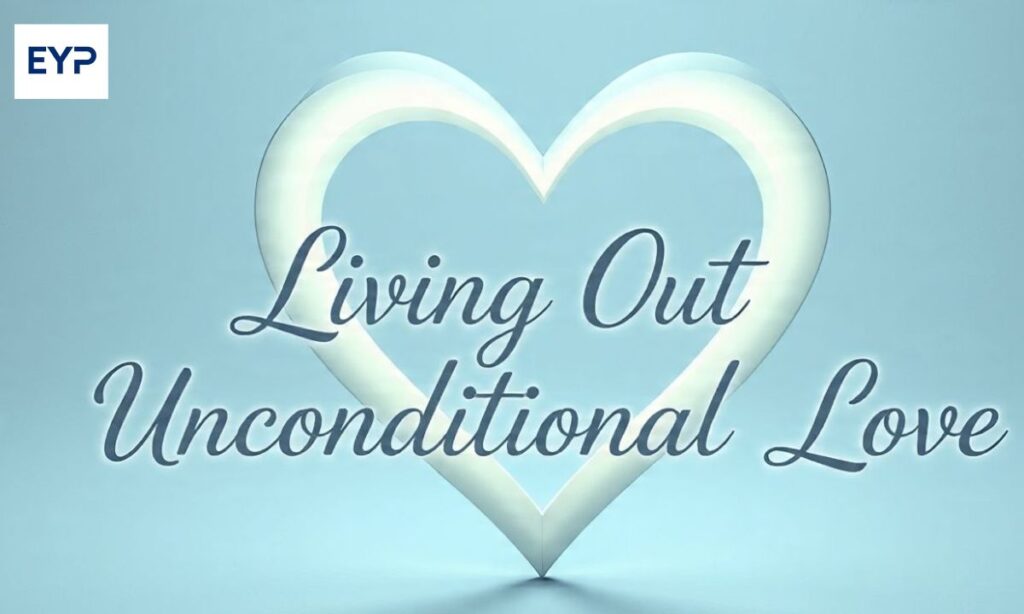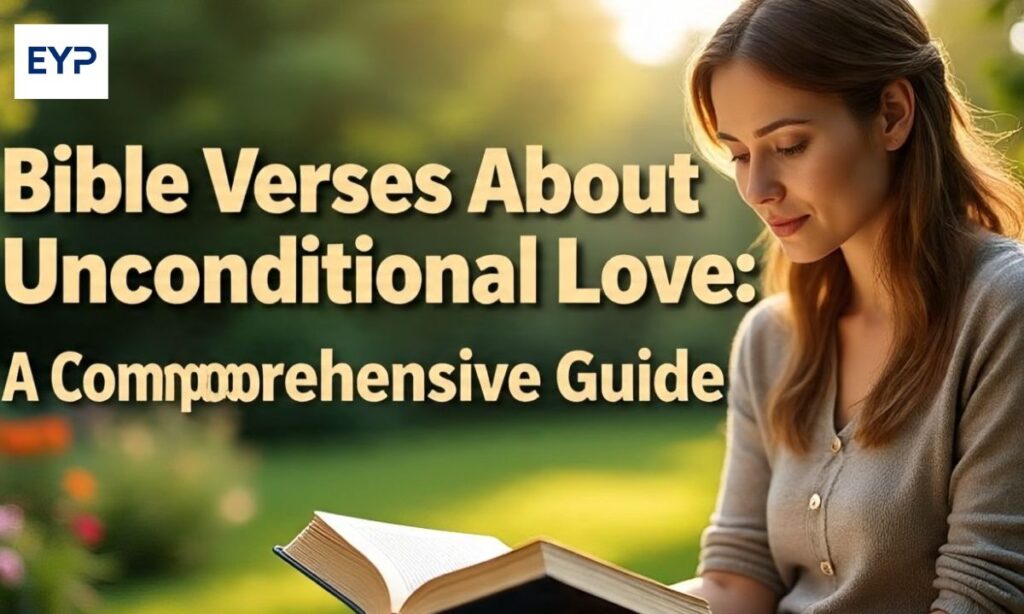Love is the heart of everything God does. It’s the reason He created us and the way He wants us to live. The Bible teaches us about a special kind of love that never gives up. This love doesn’t depend on what we do or how good we are. God loves us completely, just as we are. His love never changes, no matter what happens. It’s always there, waiting for us to accept it. This amazing love transforms our hearts and our lives.
When we understand God’s love, we learn to love others the same way. We can forgive people who hurt us. We can be kind to those who don’t deserve it. We can help others without expecting anything back. This love makes us different from the world around us.
God’s Unconditional Love
1. John 3:16
“For God so loved the world that he gave his one and only Son, that whoever believes in him shall not perish but have eternal life.”
This verse encapsulates the entirety of God’s love story with humanity. The Greek word “agape” used here represents the highest form of love – selfless, sacrificial, and unconditional. God’s love extends to the entire world, regardless of race, status, or moral standing.
The giving of His Son demonstrates that divine love is not passive but actively seeks the highest good for the beloved, even at great personal cost.
2. Romans 5:8
“But God demonstrates his own love for us in this: While we were still sinners, Christ died for us.”
This passage reveals the radical nature of God’s love. Unlike human love that often depends on the worthiness or attractiveness of the object, God’s love is demonstrated precisely when we are at our worst.
The timing of Christ’s sacrifice – while we were still in rebellion against God – proves that divine love is not earned but freely given.
3. 1 John 4:9-10
“This is how God showed his love among us: He sent his one and only Son into the world that we might live through him. This is love: not that we loved God, but that he loved us and sent his Son as an atoning sacrifice for our sins.”
These verses emphasize that God’s love is initiatory rather than responsive. Human love often begins as a reaction to being loved first, but God’s love originates from His nature rather than our actions.
The incarnation and atonement represent love in its purest form – seeking the welfare of others without expectation of return.
4. Ephesians 2:4-5
“But because of his great love for us, God, who is rich in mercy, made us alive with Christ even when we were dead in transgressions—it is by grace you have been saved.”
Paul connects God’s love directly with His mercy and grace, showing that divine love actively works to transform hopeless situations.
The metaphor of spiritual death and resurrection illustrates how God’s love doesn’t merely accept us as we are but transforms us into what we were meant to be.
5. Psalm 136:1
“Give thanks to the Lord, for he is good. His love endures forever.”
The Hebrew word “hesed” used here encompasses loyal love, faithfulness, and steadfast commitment. This psalm refrain, repeated throughout the chapter, emphasizes the eternal duration of God’s love.
Unlike human love that may waver or fade, God’s love remains constant across generations and circumstances.
6. 1 John 4:16
“And so we know and rely on the love God has for us. God is love. Whoever lives in love lives in God, and God in them.”
This verse presents perhaps the most profound statement about God’s nature in Scripture. Love is not merely an attribute of God; it is His very essence. This means that every expression of genuine love participates in the divine nature, creating a mystical union between God and the loving person.
7. Jeremiah 31:3
“The Lord appeared to us in the past, saying: ‘I have loved you with an everlasting love; I have drawn you with unfailing kindness.'”
God’s declaration through Jeremiah reveals both the eternal nature and the magnetic quality of divine love. This everlasting love preceded our existence and will continue beyond our earthly life.
The Hebrew word for “drawn” suggests a gentle, persistent attraction rather than coercive force.
8. Isaiah 54:10
“Though the mountains be shaken and the hills be removed, yet my unfailing love for you will not be shaken nor my covenant of peace be removed,’ says the Lord, who has compassion on you.”
Using the imagery of immovable mountains, God emphasizes that His love is more stable than the most permanent features of creation.
This promise comes in a context of restoration after judgment, showing that even divine discipline flows from love and leads to renewed relationships.
9. Romans 8:38-39
“For I am convinced that neither death nor life, neither angels nor demons, neither the present nor the future, nor any powers, neither height nor depth, nor anything else in all creation, will be able to separate us from the love of God that is in Christ Jesus our Lord.”
Paul’s comprehensive list covers every conceivable threat to our relationship with God, categorically denying their power to sever divine love.
This assurance provides believers with unshakeable security in God’s commitment to them.
10. Zephaniah 3:17
“The Lord your God is with you, the Mighty Warrior who saves. He will take great delight in you; in his love he will no longer rebuke you, but will rejoice over you with singing.”
This tender image portrays God as a loving parent who finds joy in His children. The Hebrew suggests God literally dances with joy over His beloved.
This verse reveals that God’s love is not duty or obligation but genuine delight in relationship.
Love for Others

1. Matthew 22:37-39
“Jesus replied: ‘Love the Lord your God with all your heart and with all your soul and with all your mind.’ This is the first and greatest commandment. And the second is like it: ‘Love your neighbor as yourself.'”
Jesus identifies love as the supreme commandment, encompassing our entire being – emotions, will, and intellect. The connection between loving God and loving others is inseparable; one cannot truly exist without the other. Self-love here is not narcissism but healthy self-regard that enables genuine care for others.
2. 1 John 4:7
“Dear friends, let us love one another, for love comes from God. Everyone who loves has been born of God and knows God.”
John establishes love as the evidence of spiritual birth and divine relationship. This love is not generated by human effort but flows from God as its source. Those who consistently demonstrate love prove their connection to the God who is love.
3. Luke 6:35
“But love your enemies, do good to them, and lend to them without expecting to get anything back. Then your reward will be great, and you will be children of the Most High, because he is kind to the ungrateful and wicked.”
Jesus calls for love that mirrors God’s character – extending kindness to those who don’t deserve it. This radical love distinguishes God’s children from the world and reflects the divine nature that shows kindness to all humanity regardless of their response.
4. John 15:12
“My command is this: Love each other as I have loved you.”
Christ’s love becomes both the model and the motivation for Christian love. The quality and intensity of Jesus’ love – sacrificial, selfless, and unconditional – sets the standard for believers’ relationships with others.
5. 1 Corinthians 13:4-7
“Love is patient, love is kind. It does not envy, it does not boast, it is not proud. It does not dishonor others, it is not self-seeking, it is not easily angered, it keeps no record of wrongs. Love does not delight in evil but rejoices with the truth. It always protects, always trusts, always hopes, always perseveres.”
Paul’s famous description provides concrete characteristics of authentic love. These qualities form a practical checklist for evaluating the genuineness of our love for others. Each attribute requires deliberate choice and often personal sacrifice.
Love in Action
1. James 2:15-16
“Suppose a brother or a sister is without clothes and daily food. If one of you says to them, ‘Go in peace; keep warm and well fed,’ but does nothing about their physical needs, what good is it?”
James challenges empty expressions of love that offer words without works. Authentic love responds to physical and material needs, not just spiritual or emotional ones. This passage condemns love that remains theoretical rather than practical.
2. 1 John 3:18
“Dear children, let us not love with words or speech but with actions and in truth.”
John emphasizes that love must be verified by behavior. Words alone, however beautiful or sincere, cannot constitute love if they are not accompanied by corresponding actions. Truth here refers to reality rather than falsehood.
3. Matthew 25:35-36
“For I was hungry and you gave me something to eat, I was thirsty and you gave me something to drink, I was a stranger and you invited me in, I needed clothes and you clothed me, I was sick and you looked after me, I was in prison and you came to visit me.”
Jesus identifies caring for society’s most vulnerable members as caring for Him personally. This passage elevates practical service to the highest spiritual significance, making love for the needy a form of worship.
Love and Forgiveness
1. Matthew 18:21-22
“Then Peter came to Jesus and asked, ‘Lord, how many times shall I forgive my brother or sister who sins against me? Up to seven times?’ Jesus answered, ‘I tell you, not seven times, but seventy-seven times.'”
Jesus’ response indicates that forgiveness should be limitless. The specific number is less important than the principle of continuous forgiveness. This reflects God’s inexhaustible forgiveness toward us.
2. Ephesians 4:32
“Be kind and compassionate to one another, forgiving each other, just as in Christ God forgave you.”
Paul connects our forgiveness of others directly to God’s forgiveness of us. The motivation for forgiving others comes from gratitude for divine forgiveness rather than the worthiness of those who have wronged us.
Living Out Unconditional Love

1. Matthew 5:44
“But I tell you, love your enemies and pray for those who persecute you.”
Jesus commands what seems humanly impossible – genuine love for those who cause us harm. This love is not based on feelings but on deliberate acts of goodwill and intercession, demonstrating divine character.
2. 1 John 4:19
“We love because he first loved us.”
This verse reveals both the source and the sequence of love. Human love is always a response to divine love. Understanding and experiencing God’s love for us enables and motivates us to love others unconditionally.
Conclusion
God’s unconditional love is the greatest gift we will ever receive. It’s free, it’s permanent, and it’s available to everyone right now. This love has the power to change everything about our lives. When we truly understand how much God loves us, we can’t help but love others differently. We become more patient, more forgiving, and more generous with our hearts.
This kind of love makes us whole and gives our lives real meaning.Living out unconditional love isn’t always easy, but it’s always worth it. Some days we’ll fail, and that’s okay because God’s love covers our mistakes too. We can ask Him to help us love like He loves.






